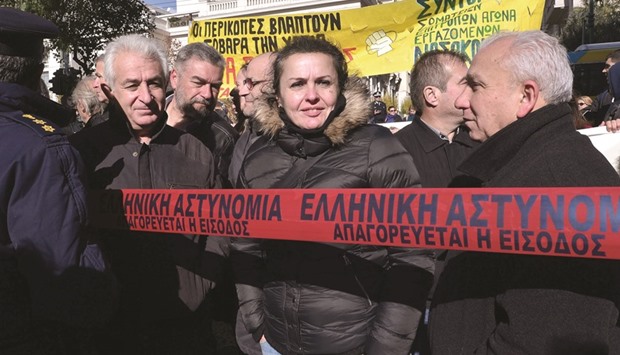Eurozone finance ministers yesterday suspended debt relief for bailed-out Greece after Greek Prime Minister Alexis Tsipras hiked spending for pensioners, angering austerity champion Germany.
The setback echoed the worst setbacks of the Greek debt crisis as the eurozone and the International Monetary Fund battle over how far to push Athens on implementing more tough policy reforms.
Leftist premier Tsipras on Thursday made the surprise one-off payout to 1.6mn low-income pensioners, along with a sales tax break for islands sheltering thousands of migrants.
Tsipras’ critics at home immediately denounced it as an electoral ploy but the premier said “Europe owes a debt” to the islands that are on the frontline of the migrant crisis.
Eurozone finance ministers however said the measures could violate the terms of Greece’s third bailout, agreed in July 2015 after six months of bitter talks that nearly saw
Athens crash out of the euro.
“The institutions have concluded that the actions of the Greek government appear to not be in line with our agreements,” said a spokesman for Eurogroup chief Jeroen Dijsselbloem, the head of the 19-nation eurozone club which oversees Greece’s massive 86bn euro bailout.
There is “no unanimity now for implementing short-term debt measures,” he added.
The Athens stock exchange index lost over three percent in response to the announcement which came after Berlin expressed its firm opposition to the extra spending by Tsipras.
“If the rescue programme is going to be deemed a success, it is imperative that measures are not taken unilaterally,” a spokesman for the German Finance Ministry said in response to the 617-million-euro
package.
Berlin asked that the institutions overseeing the bailout – the European Commission, the ECB and the eurozone’s ESM bailout fund – review the measures and suspend the hard-won and very modest debt relief measures.
Greece’s debt totals more than 300bn euros, equal to 180% of total annual economic output and compared with the European Union’s ceiling of 60%.
The “short-term” debt relief was agreed by eurozone ministers on December 5 despite criticism by the International Monetary Fund that the measures fell well short of what was necessary to get Greece back on its feet.
They crucially did not include an outright reduction in the Greek debt mountain, backed by the IMF as the only way forward but firmly opposed by hard-line eurozone governments led by Germany.
Instead, the highly technical measures include extending maturities on certain loans and locking in the interest rate on some debt so as to reduce the repayment burden, not the total owed.
The tough stance against Athens is led by Berlin’s powerful finance minister Wolfgang Schaeuble as key elections approach next year in Germany and the Netherlands, where bailout fatigue is fanning voter discontent.
Dijsselbloem’s spokesman said that the institutions overseing the bailout would report back to the finance ministers in January.
Unlike during the worst of the crisis, Athens remains financially afloat for now and is not in urgent need of fresh bailout funds.
Analysts believe that Greece’s financial situation could become more serious in the spring, when big debt payments to the European Central Bank come due.

Striking health workers stand by police blockade near the Greek prime minister’s office in Athens yesterday during their protest against austerity measures. Health workers called for work stoppage to denounce the lack of financing in the health sector.
